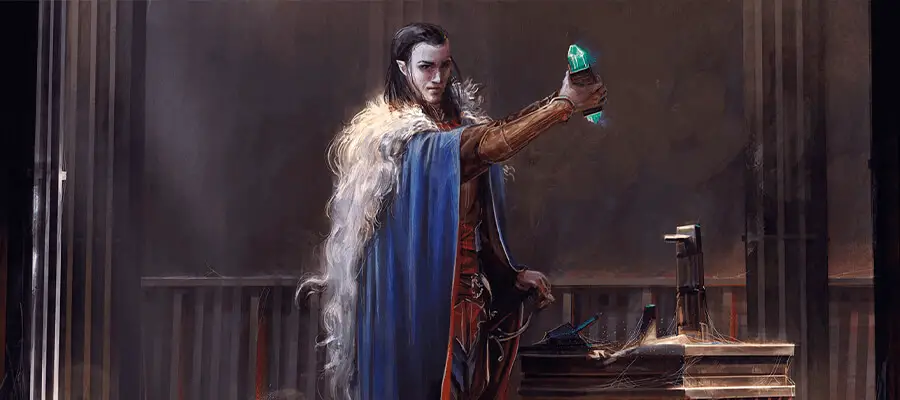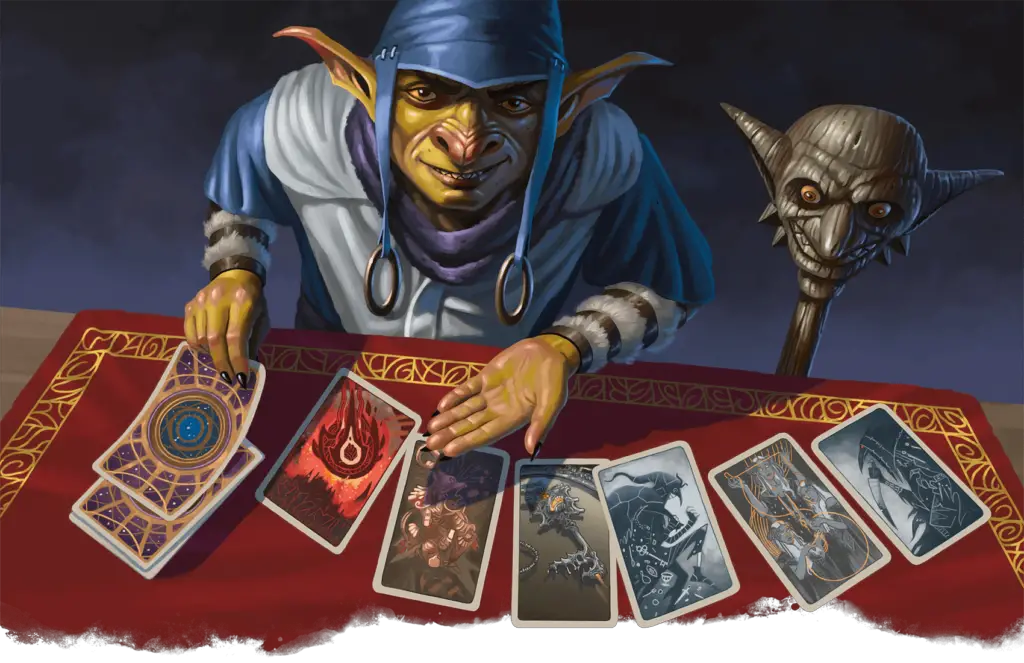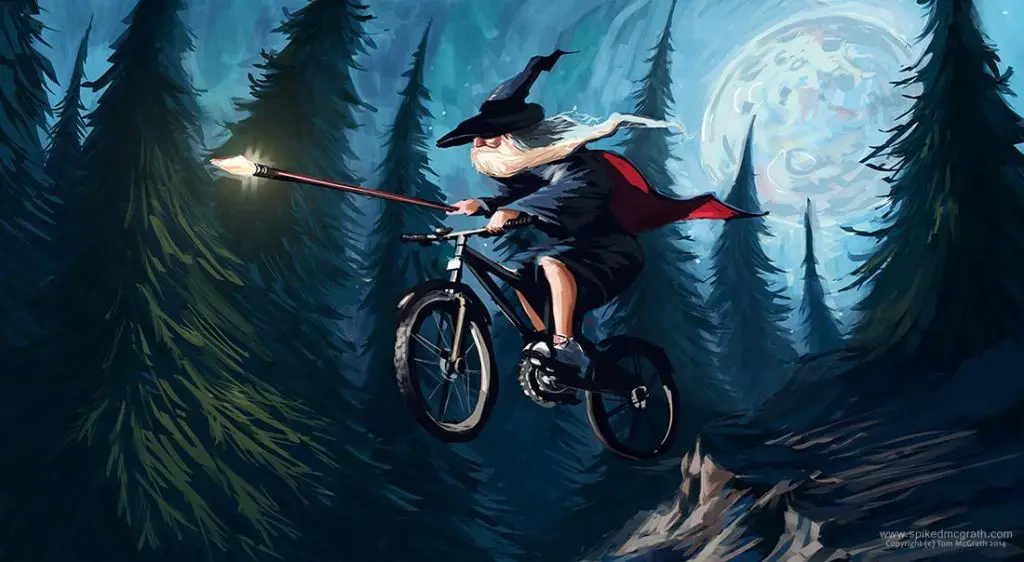Featured art for this D&D 5e Bard Feats guide is property of Wizards of the Coast in the Tasha’s Cauldron of Everything book for D&D 5e.
This article contains affiliate links that add gold to our coffers.
Welcome to the entertainer’s guide to the best feats for Bards in D&D 5e; I’ll reveal the fashionable feats to earn your Bard acclaim throughout the realms of your TTRPG. Feats are powerful customizations when coupled cleverly with class abilities. Some feats are better than others, so I’ll direct you to Bard feats that are worth your character’s time to learn.
Feats are spread out through several books, making it difficult to settle on 5e’s best Bard feats. I’m guiding your Bard to the best feats and weeding out the worst. My feat recommendations come from officially published sources, such as the PHB, TCoE, XGtE, etc.
How to Select Bard Feats
The Bard class has the luxury of focusing on its Charisma with slight investments in Dexterity and Constitution. Charisma is helpful for skill checks, spellcasting, and Bardic Inspiration. Feats that boost stats are extra spicy for a Bard.
Bards use their bonus actions for various abilities, especially Bardic Inspiration, to support their allies. They may also need their reactions for their subclass features and other abilities, like casting Counterspell if they chose it for their Magical Secrets. The bonus actions and reactions of a Bard may be utilized, but I wouldn’t call their action economy crowded, so I’ll still consider feats that use bonus actions or reactions.
Charisma classes like the Bard are commonly multiclassed, so the possibilities are vast and not worth going over in this feat article. For simplicity’s sake, I’ll stick to the core Bard class for my recommendations.
D&D 5e Bard Feats with Character Concepts
I mentioned before that Bards really are versatile jacks of all trades, so I’ve grouped my feat recommendations for the different Bard specialties I know and image players go for. While my recommendations will help you identify feats that suit a typical Bard, don’t shy away from feats that make your Bard unique. As long as you know what you’re getting into, you can have fun with many feat options.
Mentalist: College of Spirits or Whispers
This type of Bard is one to use illusions and other tricks to manipulate people. These feats complement subterfuge.
Telekinetic + Telepathic + Shadow Touched + Charisma Stat Boosts
Bards who possess supernatural powers will lend well to this combination of feats. Music has unlocked the power of the mind in unexpected ways. Musical notes are used to weave illusory magic to beguile and illustrate. You can grant Bardic Inspiration with your mind alone (read the image caption on page 81 of TCoE.
These feats come with stat boosts that are very useful for a bard. You may not need Ability Score Improvements to reach a Charisma score of twenty, depending on your beginning stats and lineage.
Your DM might allow you to cast spells on creatures while ignoring verbal spellcasting components. This would allow you to cast a verbal-only spell with your brain instead of your tongue! Vicious Mockery is an example of a verbal-only spell.
Shadow Touched can get you several interesting spells, including Cause Fear, Silent Image, and Disguise Self. Each of these spells can be used for eerie ideas that cross your mind as you interact with others. I’m picturing possibilities for carnival tricks and deceptions aplenty with this build.
Leader: College of Eloquence Bard Feats
The College of Eloquence excels at social interactions and leadership. These feats help you inspire peasants and bolster allies.
Inspiring Leader + Moderately Armored + Bountiful Luck (Halfling only) + Fey Touched + Charisma Stat Boosts
You excel at inspiring and assisting your allies. You’ve trained to defend yourself from harm, so you aren’t the weak link in your unit. Armor guards your form while your eloquence supernaturally aids your allies. Spellcasting and inspiration are your focuses as you support friends.
Halflings make outstanding leaders due to their naturally humble, selfless nature. Bountiful Luck is a racial feat that Halflings can use to share their luck for rerolling d20 ones with nearby allies as a reaction.
I used to include Chef on this list, but the joke wasn’t funny enough (haha). Fey Touched is a much better feat for a Bard, but you could also swap it for Alert, War Caster, or Lucky.
Researcher: College of Lore Bard Feats
The Lore Bard makes a fantastic explorer, scholar, or archaeologist, enjoying new spells and sharpened skills.
Drow High Magic + Skill Expert + Fey Touched + Shadow Touched + Charisma Stat Boosts
You’re the Bard who takes pride in your depth of knowledge and breadth of spellcasting options. This feat combination is designed to give the Bard more spells, boost Charisma, and become over-qualified in more skills. The goal here is to vastly supplement the character’s spells known and focus on spellcasting.
Drow High Magic obviously only applies to characters of Drow lineage. If you’re not playing a Drow, consider rounding out your character with another feat that sounds fun. You can reference my other recommendations in this article to find something suitable.
Soothsayer: Colleges of Whispers or Glamour
You captivate audiences (sometimes more than you should). These feats gives you additional tools for your enchanting methods.
Eldritch Adept + Actor + Shadow Touched + Fey Touched + Charisma Stat Boosts
The goal here is to create a cult. Eldritch Adept is meant to grant you at-will Disguise Self without spell slots. You’ll select the Mask of Many Faces Invocation in the PHB. Able to visually mimic someone will be further augmented with the Actor feat. Enthralling Performance and Mantle of Majesty are easier to use if you can impersonate people. Remember, if you start a cult with someone’s face, and that cult makes someone mad, you’ve kept yourself separate from the organization!
Shadow Touched and Fey Touched are optional. Pick the spells that sound interesting to you for these feats. Bless would be great for a Bard taking Fey Touched. Shadow Touched can get you Inflict Wounds if you want an offensive spell without multiclassing with Warlock. Otherwise, maybe pick Cause Fear or Illusory Script to help you in your manipulations. Keep in mind you’ll often be concentrating on Disguise Self out of combat.
Archer: College of Valor Bard Feats
The College of Valor dabbles with weapons and medium armor, making them suited to using ranged weapon attacks.
Crossbow Expert + Sharpshooter + Piercer + Fighting Initiate: Archery + Dexterity Stat Boosts
Bards can be particularly deadly archers if they have the right build. The College of Valor gains proficiency with martial weapons like the coveted hand crossbow. Your hand crossbow becomes a rapid-fire launcher with the Crossbow Expert feat, and the damage racks up with Sharpshooter and Piercer.
You can offset Sharpshooter’s penalty to hit by learning the Archery Fighting Style from the Fighting Initiate feat. Still, I’d only recommend doing that if your Dexterity score is already twenty. Dexterity will improve your accuracy by one, but it also helps your other Dexterity-based rolls like Initiative and damage. Archery Fighting Style only helps you with your accuracy, and it’s marginally better than boosting your Dex.
You can skip picking Crossbow Expert if you learn the fifth-level spell Swift Quiver from the Ranger spell list using Magical Secrets. Swift Quiver weaponizes your bonus action for additional shots, but it only works with a quiver (DMs might say it’s ok with crossbow bolts, too). It takes a bonus action to set up, so you’ll need another round to start cranking out swift attacks. If you want to concentrate on other spells, you can stick with the stalwart Crossbow Expert feat.
Investing in your Dexterity means you’ll select spells that don’t rely on your Charisma modifier. You can still choose spells that force saves or make attack rolls, but keep in mind your Charisma will be lower with this type of character build. Spells like Heat Metal, Greater Invisibility, friendly-target Polymorph are excellent options if you’re not concentrating on Swift Quiver. Have fun with your archer/spellcaster!
War Caster may be better if you want to be casting spells while your hands are full, so it can replace Piercer.
Defender: Any Bard College
This type of Bard invests in armor class and doesn’t want to multiclass. It also wants to keep its spellcasting options handy while its hands are full. Bards who already have medium armor proficiency will alter this choices.
Moderately Armored + Defensive Duelist + War Caster + Infernal Constitution (Tielfing only) + Charisma Stat Boost
This is great for Bards who want to improve their survivability instead of focusing on adding to their spells known or their attack options. Bards begin with light armor proficiency, so gaining medium armor and shields with Moderately Armored is a quick way to improve AC. It also means you won’t need a Dexterity stat higher than fourteen.
Infernal Constitution only applies to Tieflings, but it helps you immensely against cold and poison. It boosts your Charisma, too.
The College of Valor can ignore the Moderately Armored feat because it already gets medium armor and shield proficiencies. I also had Tough on this recommendation list, but Tough isn’t as good as other options to prevent damage. War Caster makes sense since this Bard will have its hands full (shield and finesse weapon), but you could swap to other options, including Magic Initiate to gain the Shield spell. That would be a fine choice if you’re not a Tiefling (since you won’t be able to get Infernal Constitution).
Initiator and Controller: Any Bard College
This is a classic spellcaster who wants to pick the best spells and use them effectively. The character will want Initiative bonuses and high AC.
Alert + Fey Touched (Gift of Alacrity) + Moderately Armored + Alert + Charisma Stat Boosts
Spellcasting is great for battlefield control. This build is for expert spellcasters who know what spells they want, so they don’t need spells known expanded from other spell feats. Players choose this build if they’re confident in their spellcasting, and they want to go first to set the stage for a battle.
You really only need Alert and Fey Touched for this combination. Fey Touched gets you the Gift of Alacrity spell, allowing you to add 1d8 to your Initiative rolls. As a side note, don’t neglect to apply Jack of All Trades to your Initiative bonus.
Moderately Armored is meant to improve AC, but you can skip it if that isn’t interesting. The College of Valor can ignore the Moderately Armored feat because it already gets medium armor and shield proficiencies.
Alert protects you from hidden foes, but it is especially helpful for rolling high on Initiative. After all, winning Initiative can feel like getting an extra turn in combat.
Concentrator: Any Bard College
This type of Bard is similar to the controller/initiator above, but it focuses more on concentration. It wants bonuses to its Constitution saving throws and a high AC.
Resilient (Con) + War Caster + Lucky + Moderately Armored + Charisma Stat Boosts
This combination is similar to my Defender recommendations, but this defensive lineup is meant to secure a Bard’s concentration. Your precious spells shouldn’t be ending early when you have these feats.
Moderately Armored helps you not to get hit because your AC is much higher. Resilient gives you Constitution saving throw proficiency, and War Caster gives you advantage on concentration/Constitution saving throws triggered by taking damage. If you still fail your save, Lucky gets you a reroll.
The College of Valor can ignore the Moderately Armored feat because it already gets medium armor and shield proficiencies.
Polearm Gish: College of Valor Bard Feats
A Strength-based Bard can swing a polearm with the best of them. These feats will enable the character to dish out damage while still keeping spellcasting up their sleeve.
Polearm Master + Great Weapon Master + War Caster + Strength Stat Boosts
This is a particular type of build that probably involves multiclassing if you’re going for it. Polearm Master allows you to maintain distance with reach weapons while attacking. The goal is to learn a spell to boost the damage of your attacks, such as Spirit Shroud. The College of Valor is the only Bard that can do this without assistance from other feats or multiclassing.
Investing in your Strength means you’ll select spells that don’t rely on your Charisma modifier. You can still choose spells that force saves or make attack rolls, but keep in mind your Charisma will be lower with this type of character build. Spells like Heat Metal, Greater Invisibility, friendly-target Polymorph are excellent options if you’re not concentrating on Spirit Shroud.
It’s common for this type of build to involve three Warlock levels, making Pact Weapon compatible with a polearm. Hexblade is the natural patron for this concept. My recommendations are for Bards who don’t want to multiclass. Still, Hexblade multiclassing is super common for Charisma-based characters. They can use Charisma instead of Strength/Dexterity for weapon attacks (plus all the other features Hexblades are loaded with at level one).
The character might also benefit from Sentinel or Mobile.
Scimitar Gish: College of Swords Bard Feats
The College of Swords has unique uses for its Bardic Inspiration, allowing it to flourish in combat. These feats can help the Swords Bard use its melee abilities without getting crushed.
Defensive Duelist + Slasher + Mobile + Dexterity/Charisma Stat Boosts
The College of Swords specializes in using a scimitar. The best Flourish ability of the Swords Bard is Defensive Flourish because it boosts your damage and your AC. Defensive Duelist will further boost your AC against a single attack when you use your reaction.
The point of this build is to be a skirmisher who can strike a foe then move away. Mobile removes the need to Disengage after your attack, and Slasher will slow the target’s movement so it might not catch up to you.
You won’t neglect your spellcasting, though. This build doesn’t deal heaps of damage like the polearm gish I mentioned before, allowing you to invest in Charisma. Potent spellcasting is one of the reasons you’d make this type of character. Without spellcasting, you might as well play a Fighter.
It’s common for this type of build to involve one level of Hexblade Warlock. My recommendations are for Bards who don’t want to multiclass. Still, Hexblade multiclassing is super common for Charisma-based characters to use Charisma instead of Strength/Dexterity for their weapon attacks (plus all the other features Hexblades are loaded with at level one).
Last Thoughts on Bard Feats
Bards are versatile characters who can focus on a variety of niches. Feats help them fit into their specialties while allowing them to do a little of everything.
Tell me, which feats would you add to the list? Is there a Bard specialty I did not cover? Cast Message in the comments below about whether you emphatically agree or disagree with my recommendations. Bard is probably my least-played class, so I have much to learn. I’m always learning more about this complex game. Thank you again for reading. I hope you’ll share this article with your friends to get a discussion started.
Before you go, your Passive Perception has shown you secret passageways to discover more content about feats and character concepts!





I’m a big fan of your flavor articles (the Witch or Necromancer articles are how I found your site initially), and this one gives some nice little ideas. Looks great!
Thank you, Jason! I’m pleased that you found useful ideas in the article. Opal writes excellent lore articles, so I’m glad you found them/us. 🙂
Useful stuff. Added to my Blog Database.
Pingback: D&D College of Eloquence Bard 5E Build - Wally DM -
Always enjoy your stuff!
Just thought I’d mention that although it’s not directly feat-related per se, re: your Soothsayer “create a cult” concept: choose Changeling as your Bard’s race and Disguise Self becomes pretty superfluous! (Especially if you acquire some Glamoured Studded Leather armor as well!) The Actor feat is still helpful if you’re trying to impersonate someone specific to ensure you’ve got all the little non-appearance details down (e.g., speech cadence, mannerisms, etc.). Allows you to save spell slots for even more helpful/devious options! 🙂
That’s a great point! Some feats can be replaced with other character options, like the Changeling lineage 🙂